UK College Entrepreneurial Ventures and Social Economy Analysis Report
VerifiedAdded on 2023/01/11
|15
|4717
|71
Report
AI Summary
This report provides a comprehensive analysis of entrepreneurial ventures, exploring various types such as small businesses, large enterprises, social enterprises, and scalable enterprises, along with their respective typologies, including lifestyle and growth firms. It examines the similarities and differences between these ventures, emphasizing the importance of innovation and market responsiveness. The report delves into the impact of micro and small businesses on the UK economy, supported by relevant data and statistics, illustrating their significant contribution to GDP and employment. Furthermore, it explains the role of small businesses and start-ups in fostering the growth of the social economy, highlighting the importance of innovation, job creation, and improved standards of living. The report also discusses the characteristics, traits, and skills of successful entrepreneurs, including aspects of entrepreneurial personality and how background and experience can either foster or hinder entrepreneurial endeavors. The report concludes by summarizing the key findings and implications of the analysis.
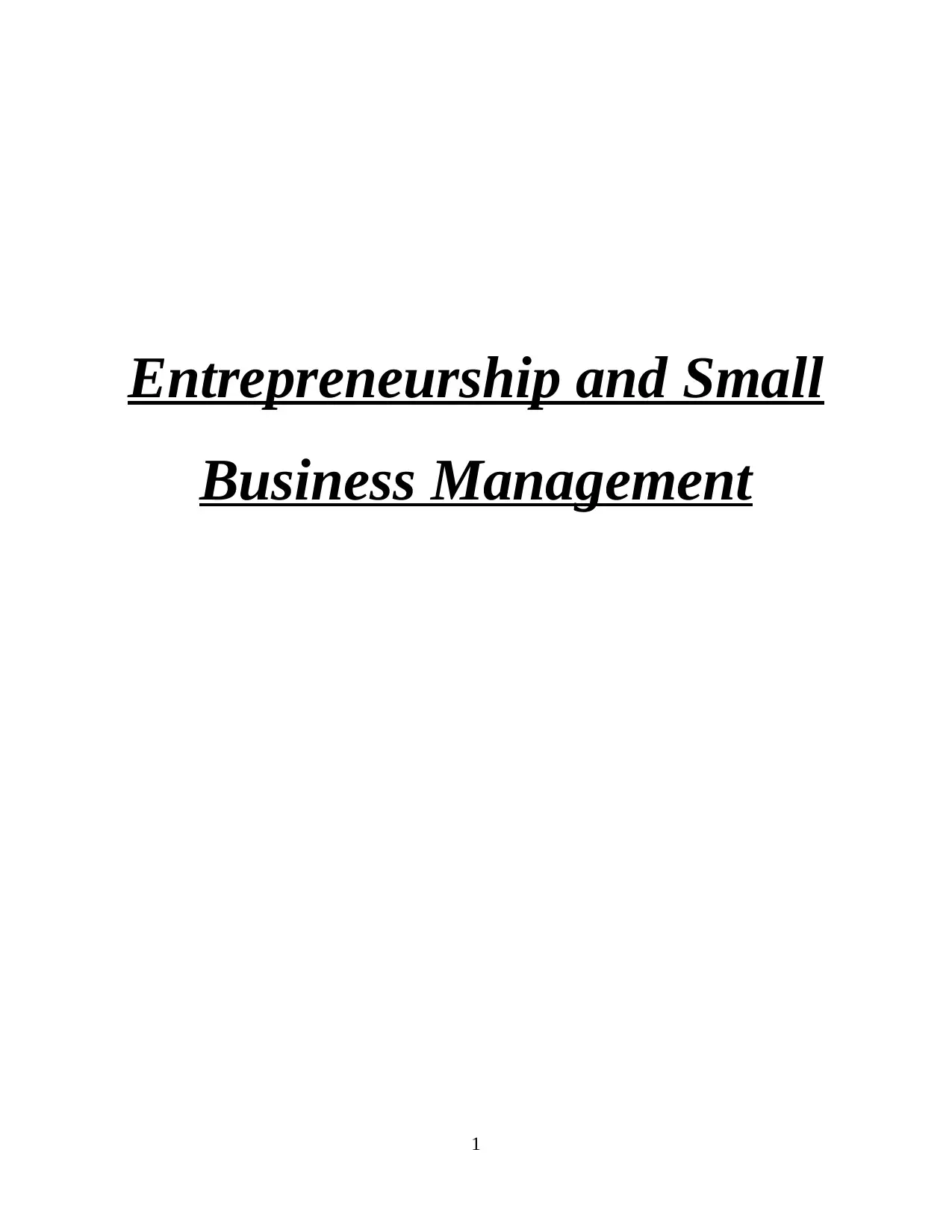
Entrepreneurship and Small
Business Management
1
Business Management
1
Paraphrase This Document
Need a fresh take? Get an instant paraphrase of this document with our AI Paraphraser
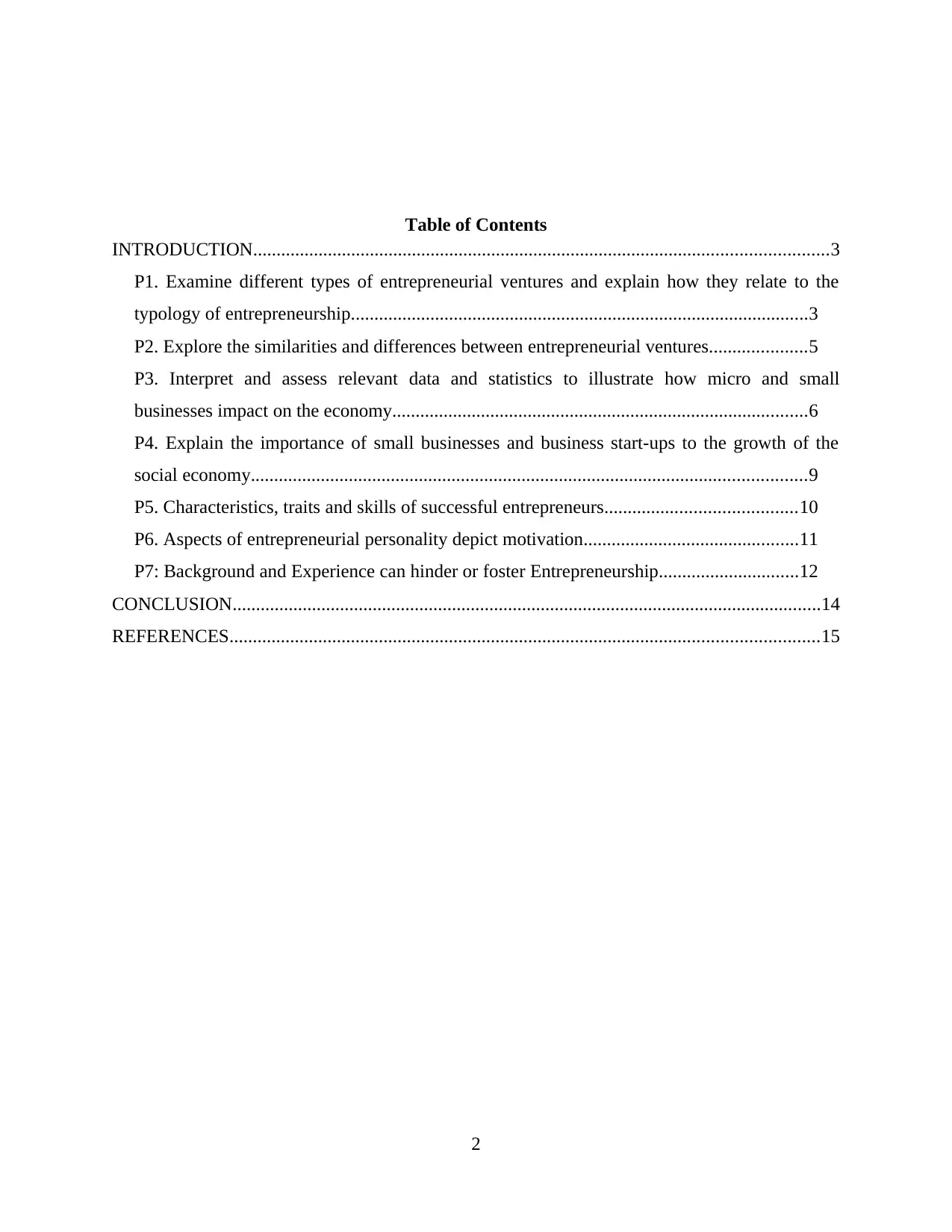
Table of Contents
INTRODUCTION...........................................................................................................................3
P1. Examine different types of entrepreneurial ventures and explain how they relate to the
typology of entrepreneurship..................................................................................................3
P2. Explore the similarities and differences between entrepreneurial ventures.....................5
P3. Interpret and assess relevant data and statistics to illustrate how micro and small
businesses impact on the economy.........................................................................................6
P4. Explain the importance of small businesses and business start-ups to the growth of the
social economy.......................................................................................................................9
P5. Characteristics, traits and skills of successful entrepreneurs.........................................10
P6. Aspects of entrepreneurial personality depict motivation..............................................11
P7: Background and Experience can hinder or foster Entrepreneurship..............................12
CONCLUSION..............................................................................................................................14
REFERENCES..............................................................................................................................15
2
INTRODUCTION...........................................................................................................................3
P1. Examine different types of entrepreneurial ventures and explain how they relate to the
typology of entrepreneurship..................................................................................................3
P2. Explore the similarities and differences between entrepreneurial ventures.....................5
P3. Interpret and assess relevant data and statistics to illustrate how micro and small
businesses impact on the economy.........................................................................................6
P4. Explain the importance of small businesses and business start-ups to the growth of the
social economy.......................................................................................................................9
P5. Characteristics, traits and skills of successful entrepreneurs.........................................10
P6. Aspects of entrepreneurial personality depict motivation..............................................11
P7: Background and Experience can hinder or foster Entrepreneurship..............................12
CONCLUSION..............................................................................................................................14
REFERENCES..............................................................................................................................15
2
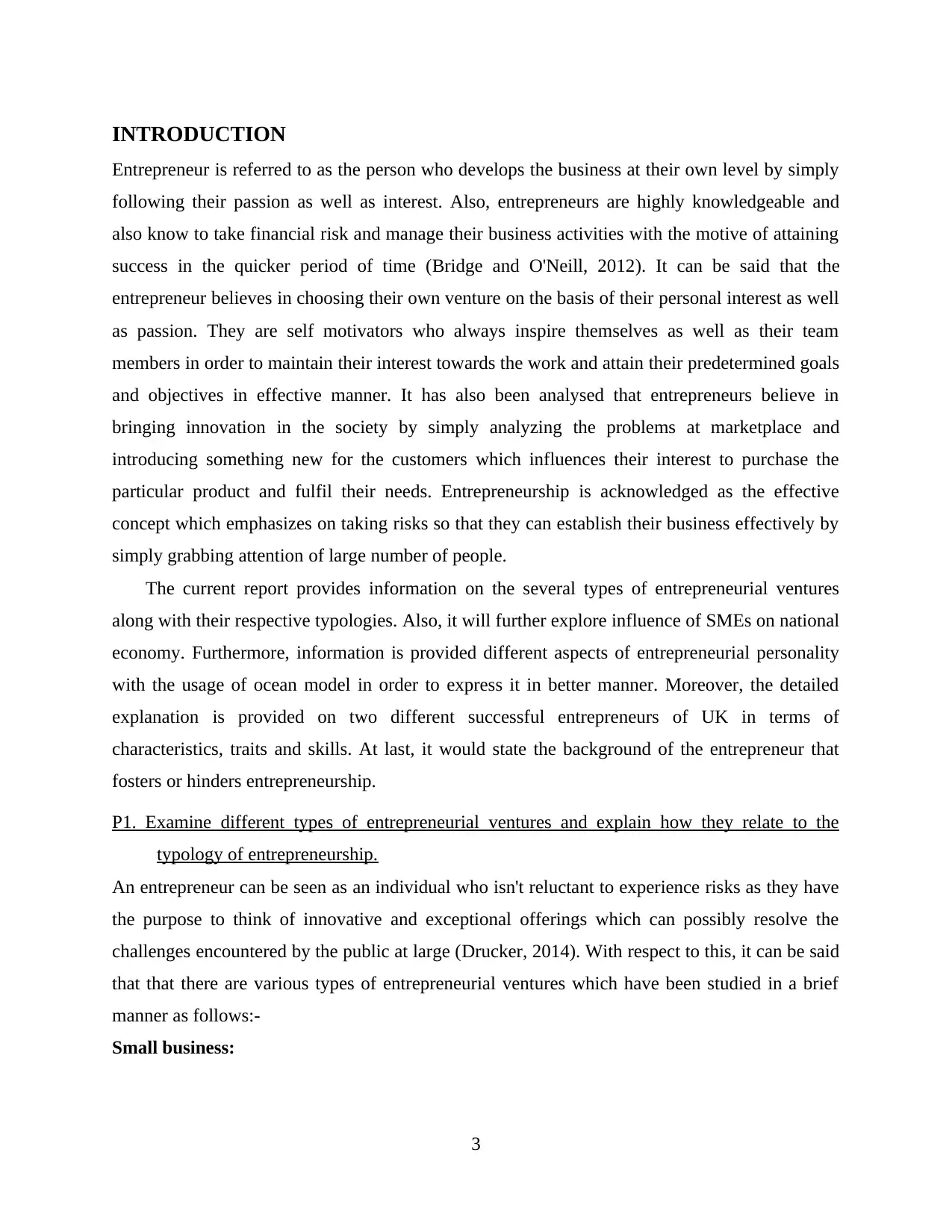
INTRODUCTION
Entrepreneur is referred to as the person who develops the business at their own level by simply
following their passion as well as interest. Also, entrepreneurs are highly knowledgeable and
also know to take financial risk and manage their business activities with the motive of attaining
success in the quicker period of time (Bridge and O'Neill, 2012). It can be said that the
entrepreneur believes in choosing their own venture on the basis of their personal interest as well
as passion. They are self motivators who always inspire themselves as well as their team
members in order to maintain their interest towards the work and attain their predetermined goals
and objectives in effective manner. It has also been analysed that entrepreneurs believe in
bringing innovation in the society by simply analyzing the problems at marketplace and
introducing something new for the customers which influences their interest to purchase the
particular product and fulfil their needs. Entrepreneurship is acknowledged as the effective
concept which emphasizes on taking risks so that they can establish their business effectively by
simply grabbing attention of large number of people.
The current report provides information on the several types of entrepreneurial ventures
along with their respective typologies. Also, it will further explore influence of SMEs on national
economy. Furthermore, information is provided different aspects of entrepreneurial personality
with the usage of ocean model in order to express it in better manner. Moreover, the detailed
explanation is provided on two different successful entrepreneurs of UK in terms of
characteristics, traits and skills. At last, it would state the background of the entrepreneur that
fosters or hinders entrepreneurship.
P1. Examine different types of entrepreneurial ventures and explain how they relate to the
typology of entrepreneurship.
An entrepreneur can be seen as an individual who isn't reluctant to experience risks as they have
the purpose to think of innovative and exceptional offerings which can possibly resolve the
challenges encountered by the public at large (Drucker, 2014). With respect to this, it can be said
that that there are various types of entrepreneurial ventures which have been studied in a brief
manner as follows:-
Small business:
3
Entrepreneur is referred to as the person who develops the business at their own level by simply
following their passion as well as interest. Also, entrepreneurs are highly knowledgeable and
also know to take financial risk and manage their business activities with the motive of attaining
success in the quicker period of time (Bridge and O'Neill, 2012). It can be said that the
entrepreneur believes in choosing their own venture on the basis of their personal interest as well
as passion. They are self motivators who always inspire themselves as well as their team
members in order to maintain their interest towards the work and attain their predetermined goals
and objectives in effective manner. It has also been analysed that entrepreneurs believe in
bringing innovation in the society by simply analyzing the problems at marketplace and
introducing something new for the customers which influences their interest to purchase the
particular product and fulfil their needs. Entrepreneurship is acknowledged as the effective
concept which emphasizes on taking risks so that they can establish their business effectively by
simply grabbing attention of large number of people.
The current report provides information on the several types of entrepreneurial ventures
along with their respective typologies. Also, it will further explore influence of SMEs on national
economy. Furthermore, information is provided different aspects of entrepreneurial personality
with the usage of ocean model in order to express it in better manner. Moreover, the detailed
explanation is provided on two different successful entrepreneurs of UK in terms of
characteristics, traits and skills. At last, it would state the background of the entrepreneur that
fosters or hinders entrepreneurship.
P1. Examine different types of entrepreneurial ventures and explain how they relate to the
typology of entrepreneurship.
An entrepreneur can be seen as an individual who isn't reluctant to experience risks as they have
the purpose to think of innovative and exceptional offerings which can possibly resolve the
challenges encountered by the public at large (Drucker, 2014). With respect to this, it can be said
that that there are various types of entrepreneurial ventures which have been studied in a brief
manner as follows:-
Small business:
3
⊘ This is a preview!⊘
Do you want full access?
Subscribe today to unlock all pages.

Trusted by 1+ million students worldwide
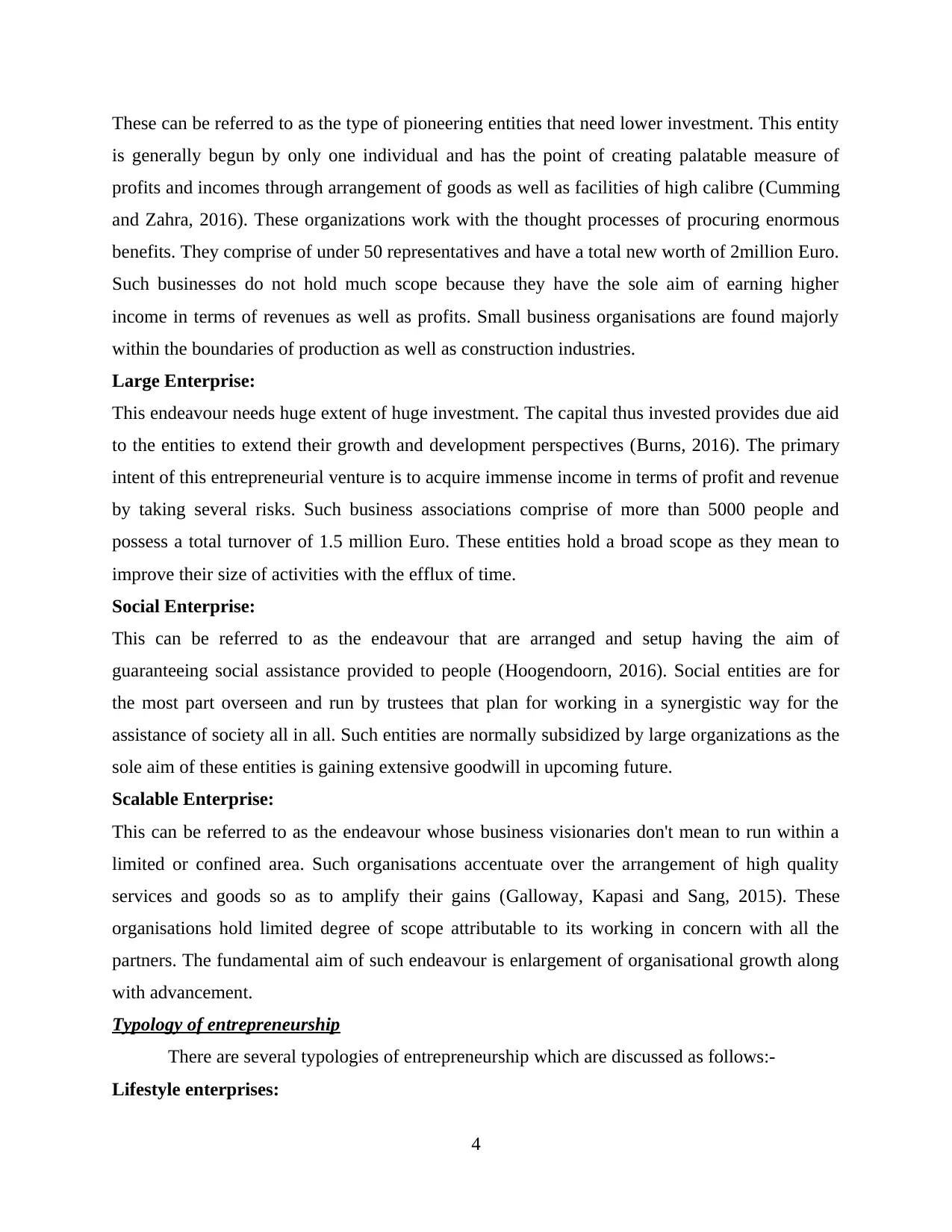
These can be referred to as the type of pioneering entities that need lower investment. This entity
is generally begun by only one individual and has the point of creating palatable measure of
profits and incomes through arrangement of goods as well as facilities of high calibre (Cumming
and Zahra, 2016). These organizations work with the thought processes of procuring enormous
benefits. They comprise of under 50 representatives and have a total new worth of 2million Euro.
Such businesses do not hold much scope because they have the sole aim of earning higher
income in terms of revenues as well as profits. Small business organisations are found majorly
within the boundaries of production as well as construction industries.
Large Enterprise:
This endeavour needs huge extent of huge investment. The capital thus invested provides due aid
to the entities to extend their growth and development perspectives (Burns, 2016). The primary
intent of this entrepreneurial venture is to acquire immense income in terms of profit and revenue
by taking several risks. Such business associations comprise of more than 5000 people and
possess a total turnover of 1.5 million Euro. These entities hold a broad scope as they mean to
improve their size of activities with the efflux of time.
Social Enterprise:
This can be referred to as the endeavour that are arranged and setup having the aim of
guaranteeing social assistance provided to people (Hoogendoorn, 2016). Social entities are for
the most part overseen and run by trustees that plan for working in a synergistic way for the
assistance of society all in all. Such entities are normally subsidized by large organizations as the
sole aim of these entities is gaining extensive goodwill in upcoming future.
Scalable Enterprise:
This can be referred to as the endeavour whose business visionaries don't mean to run within a
limited or confined area. Such organisations accentuate over the arrangement of high quality
services and goods so as to amplify their gains (Galloway, Kapasi and Sang, 2015). These
organisations hold limited degree of scope attributable to its working in concern with all the
partners. The fundamental aim of such endeavour is enlargement of organisational growth along
with advancement.
Typology of entrepreneurship
There are several typologies of entrepreneurship which are discussed as follows:-
Lifestyle enterprises:
4
is generally begun by only one individual and has the point of creating palatable measure of
profits and incomes through arrangement of goods as well as facilities of high calibre (Cumming
and Zahra, 2016). These organizations work with the thought processes of procuring enormous
benefits. They comprise of under 50 representatives and have a total new worth of 2million Euro.
Such businesses do not hold much scope because they have the sole aim of earning higher
income in terms of revenues as well as profits. Small business organisations are found majorly
within the boundaries of production as well as construction industries.
Large Enterprise:
This endeavour needs huge extent of huge investment. The capital thus invested provides due aid
to the entities to extend their growth and development perspectives (Burns, 2016). The primary
intent of this entrepreneurial venture is to acquire immense income in terms of profit and revenue
by taking several risks. Such business associations comprise of more than 5000 people and
possess a total turnover of 1.5 million Euro. These entities hold a broad scope as they mean to
improve their size of activities with the efflux of time.
Social Enterprise:
This can be referred to as the endeavour that are arranged and setup having the aim of
guaranteeing social assistance provided to people (Hoogendoorn, 2016). Social entities are for
the most part overseen and run by trustees that plan for working in a synergistic way for the
assistance of society all in all. Such entities are normally subsidized by large organizations as the
sole aim of these entities is gaining extensive goodwill in upcoming future.
Scalable Enterprise:
This can be referred to as the endeavour whose business visionaries don't mean to run within a
limited or confined area. Such organisations accentuate over the arrangement of high quality
services and goods so as to amplify their gains (Galloway, Kapasi and Sang, 2015). These
organisations hold limited degree of scope attributable to its working in concern with all the
partners. The fundamental aim of such endeavour is enlargement of organisational growth along
with advancement.
Typology of entrepreneurship
There are several typologies of entrepreneurship which are discussed as follows:-
Lifestyle enterprises:
4
Paraphrase This Document
Need a fresh take? Get an instant paraphrase of this document with our AI Paraphraser
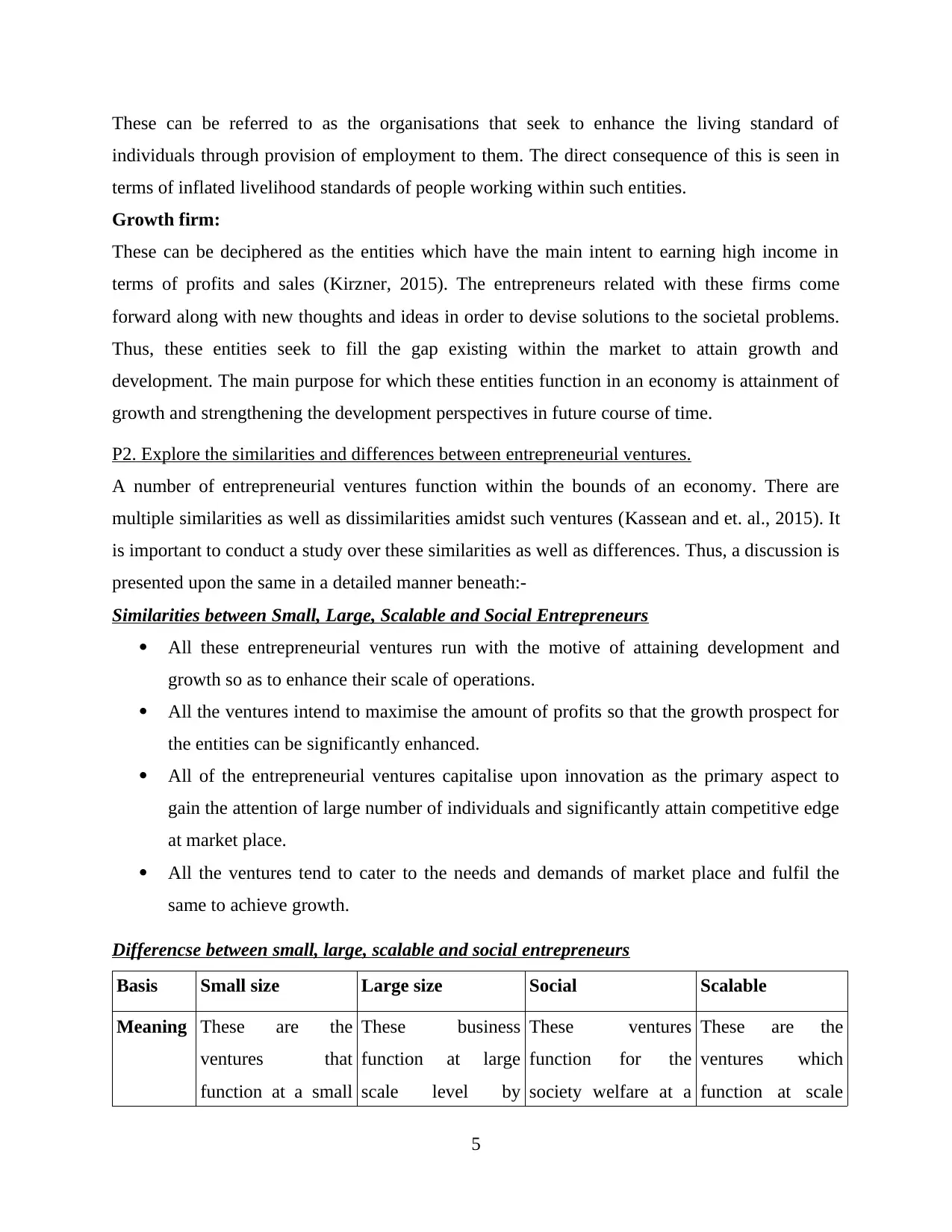
These can be referred to as the organisations that seek to enhance the living standard of
individuals through provision of employment to them. The direct consequence of this is seen in
terms of inflated livelihood standards of people working within such entities.
Growth firm:
These can be deciphered as the entities which have the main intent to earning high income in
terms of profits and sales (Kirzner, 2015). The entrepreneurs related with these firms come
forward along with new thoughts and ideas in order to devise solutions to the societal problems.
Thus, these entities seek to fill the gap existing within the market to attain growth and
development. The main purpose for which these entities function in an economy is attainment of
growth and strengthening the development perspectives in future course of time.
P2. Explore the similarities and differences between entrepreneurial ventures.
A number of entrepreneurial ventures function within the bounds of an economy. There are
multiple similarities as well as dissimilarities amidst such ventures (Kassean and et. al., 2015). It
is important to conduct a study over these similarities as well as differences. Thus, a discussion is
presented upon the same in a detailed manner beneath:-
Similarities between Small, Large, Scalable and Social Entrepreneurs
All these entrepreneurial ventures run with the motive of attaining development and
growth so as to enhance their scale of operations.
All the ventures intend to maximise the amount of profits so that the growth prospect for
the entities can be significantly enhanced.
All of the entrepreneurial ventures capitalise upon innovation as the primary aspect to
gain the attention of large number of individuals and significantly attain competitive edge
at market place.
All the ventures tend to cater to the needs and demands of market place and fulfil the
same to achieve growth.
Differencse between small, large, scalable and social entrepreneurs
Basis Small size Large size Social Scalable
Meaning These are the
ventures that
function at a small
These business
function at large
scale level by
These ventures
function for the
society welfare at a
These are the
ventures which
function at scale
5
individuals through provision of employment to them. The direct consequence of this is seen in
terms of inflated livelihood standards of people working within such entities.
Growth firm:
These can be deciphered as the entities which have the main intent to earning high income in
terms of profits and sales (Kirzner, 2015). The entrepreneurs related with these firms come
forward along with new thoughts and ideas in order to devise solutions to the societal problems.
Thus, these entities seek to fill the gap existing within the market to attain growth and
development. The main purpose for which these entities function in an economy is attainment of
growth and strengthening the development perspectives in future course of time.
P2. Explore the similarities and differences between entrepreneurial ventures.
A number of entrepreneurial ventures function within the bounds of an economy. There are
multiple similarities as well as dissimilarities amidst such ventures (Kassean and et. al., 2015). It
is important to conduct a study over these similarities as well as differences. Thus, a discussion is
presented upon the same in a detailed manner beneath:-
Similarities between Small, Large, Scalable and Social Entrepreneurs
All these entrepreneurial ventures run with the motive of attaining development and
growth so as to enhance their scale of operations.
All the ventures intend to maximise the amount of profits so that the growth prospect for
the entities can be significantly enhanced.
All of the entrepreneurial ventures capitalise upon innovation as the primary aspect to
gain the attention of large number of individuals and significantly attain competitive edge
at market place.
All the ventures tend to cater to the needs and demands of market place and fulfil the
same to achieve growth.
Differencse between small, large, scalable and social entrepreneurs
Basis Small size Large size Social Scalable
Meaning These are the
ventures that
function at a small
These business
function at large
scale level by
These ventures
function for the
society welfare at a
These are the
ventures which
function at scale
5
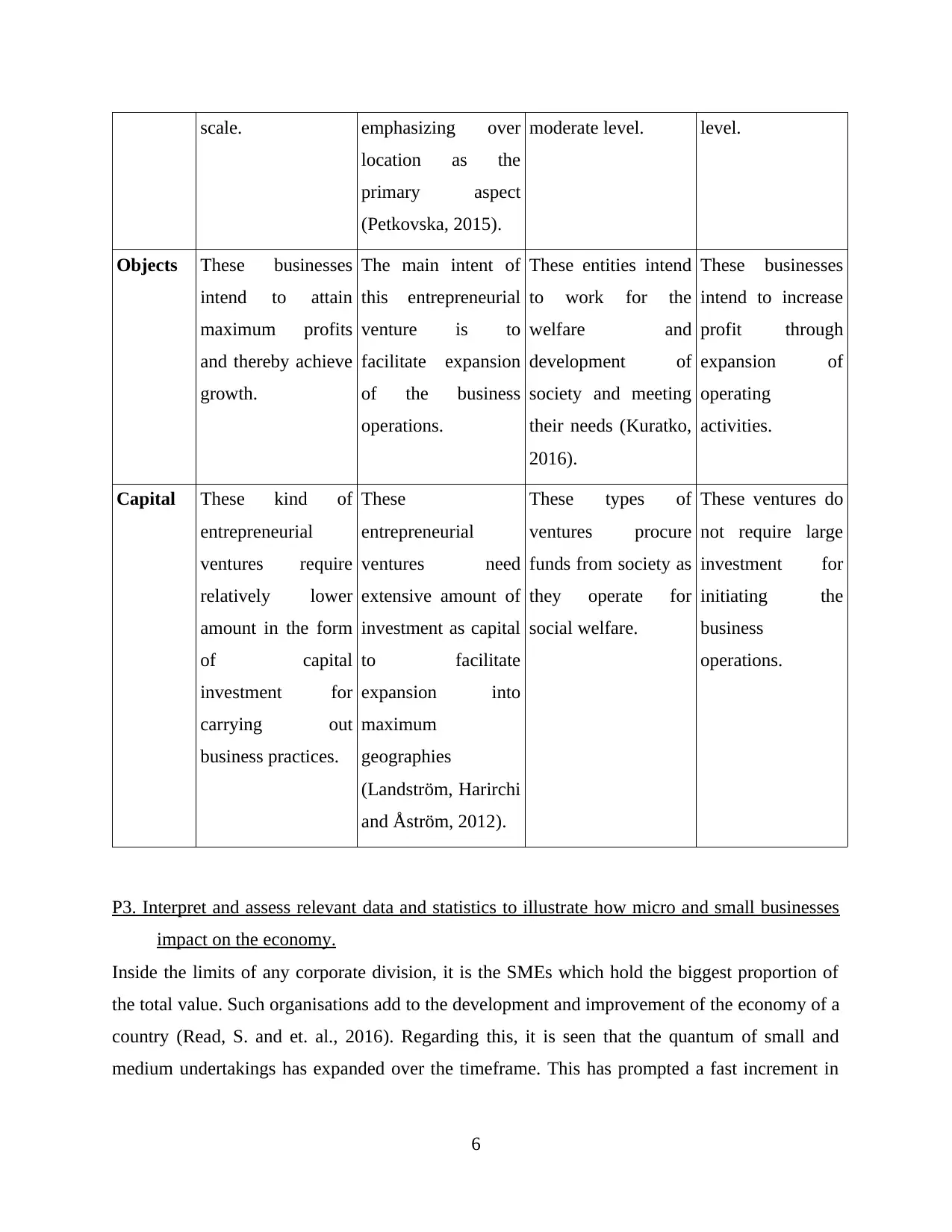
scale. emphasizing over
location as the
primary aspect
(Petkovska, 2015).
moderate level. level.
Objects These businesses
intend to attain
maximum profits
and thereby achieve
growth.
The main intent of
this entrepreneurial
venture is to
facilitate expansion
of the business
operations.
These entities intend
to work for the
welfare and
development of
society and meeting
their needs (Kuratko,
2016).
These businesses
intend to increase
profit through
expansion of
operating
activities.
Capital These kind of
entrepreneurial
ventures require
relatively lower
amount in the form
of capital
investment for
carrying out
business practices.
These
entrepreneurial
ventures need
extensive amount of
investment as capital
to facilitate
expansion into
maximum
geographies
(Landström, Harirchi
and Åström, 2012).
These types of
ventures procure
funds from society as
they operate for
social welfare.
These ventures do
not require large
investment for
initiating the
business
operations.
P3. Interpret and assess relevant data and statistics to illustrate how micro and small businesses
impact on the economy.
Inside the limits of any corporate division, it is the SMEs which hold the biggest proportion of
the total value. Such organisations add to the development and improvement of the economy of a
country (Read, S. and et. al., 2016). Regarding this, it is seen that the quantum of small and
medium undertakings has expanded over the timeframe. This has prompted a fast increment in
6
location as the
primary aspect
(Petkovska, 2015).
moderate level. level.
Objects These businesses
intend to attain
maximum profits
and thereby achieve
growth.
The main intent of
this entrepreneurial
venture is to
facilitate expansion
of the business
operations.
These entities intend
to work for the
welfare and
development of
society and meeting
their needs (Kuratko,
2016).
These businesses
intend to increase
profit through
expansion of
operating
activities.
Capital These kind of
entrepreneurial
ventures require
relatively lower
amount in the form
of capital
investment for
carrying out
business practices.
These
entrepreneurial
ventures need
extensive amount of
investment as capital
to facilitate
expansion into
maximum
geographies
(Landström, Harirchi
and Åström, 2012).
These types of
ventures procure
funds from society as
they operate for
social welfare.
These ventures do
not require large
investment for
initiating the
business
operations.
P3. Interpret and assess relevant data and statistics to illustrate how micro and small businesses
impact on the economy.
Inside the limits of any corporate division, it is the SMEs which hold the biggest proportion of
the total value. Such organisations add to the development and improvement of the economy of a
country (Read, S. and et. al., 2016). Regarding this, it is seen that the quantum of small and
medium undertakings has expanded over the timeframe. This has prompted a fast increment in
6
⊘ This is a preview!⊘
Do you want full access?
Subscribe today to unlock all pages.

Trusted by 1+ million students worldwide
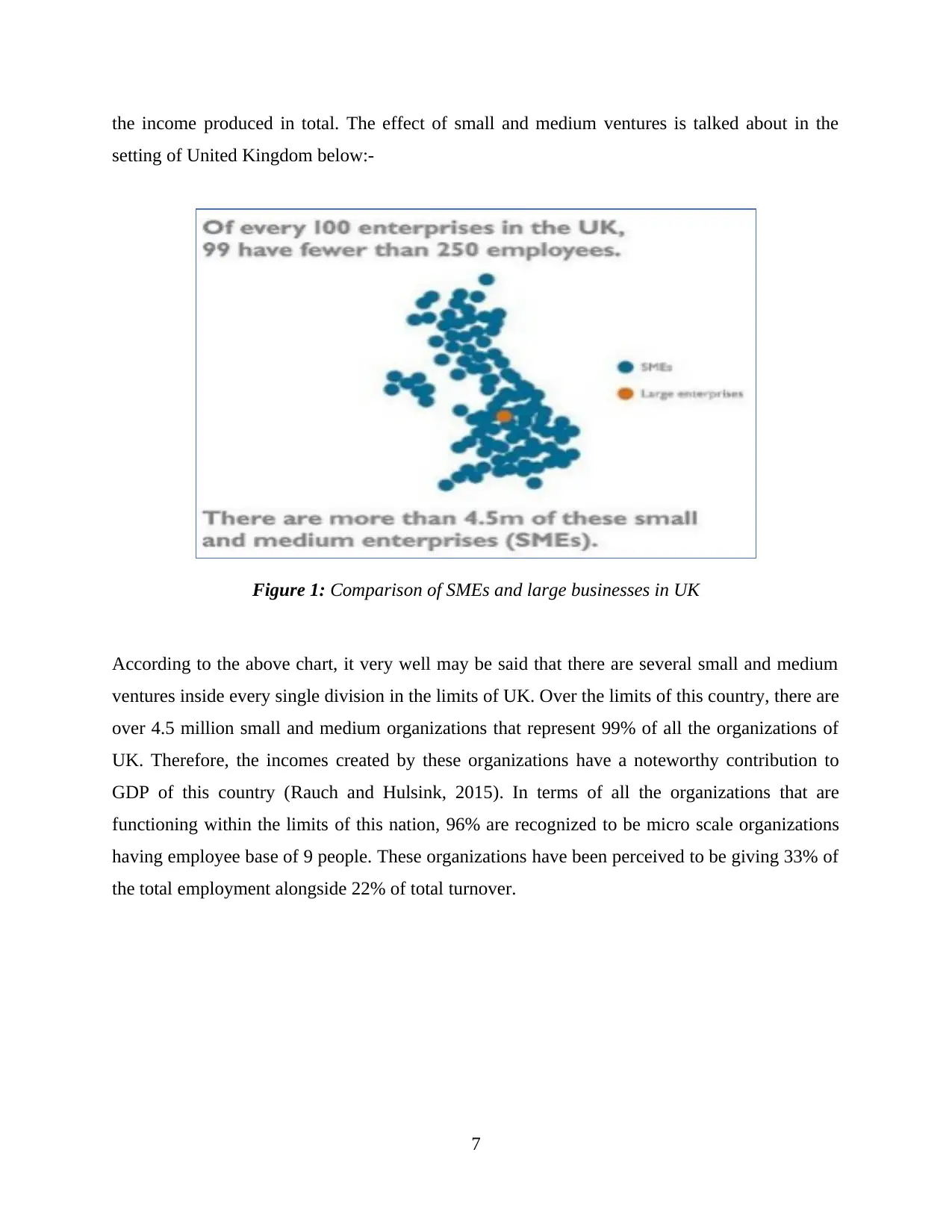
the income produced in total. The effect of small and medium ventures is talked about in the
setting of United Kingdom below:-
Figure 1: Comparison of SMEs and large businesses in UK
According to the above chart, it very well may be said that there are several small and medium
ventures inside every single division in the limits of UK. Over the limits of this country, there are
over 4.5 million small and medium organizations that represent 99% of all the organizations of
UK. Therefore, the incomes created by these organizations have a noteworthy contribution to
GDP of this country (Rauch and Hulsink, 2015). In terms of all the organizations that are
functioning within the limits of this nation, 96% are recognized to be micro scale organizations
having employee base of 9 people. These organizations have been perceived to be giving 33% of
the total employment alongside 22% of total turnover.
7
setting of United Kingdom below:-
Figure 1: Comparison of SMEs and large businesses in UK
According to the above chart, it very well may be said that there are several small and medium
ventures inside every single division in the limits of UK. Over the limits of this country, there are
over 4.5 million small and medium organizations that represent 99% of all the organizations of
UK. Therefore, the incomes created by these organizations have a noteworthy contribution to
GDP of this country (Rauch and Hulsink, 2015). In terms of all the organizations that are
functioning within the limits of this nation, 96% are recognized to be micro scale organizations
having employee base of 9 people. These organizations have been perceived to be giving 33% of
the total employment alongside 22% of total turnover.
7
Paraphrase This Document
Need a fresh take? Get an instant paraphrase of this document with our AI Paraphraser
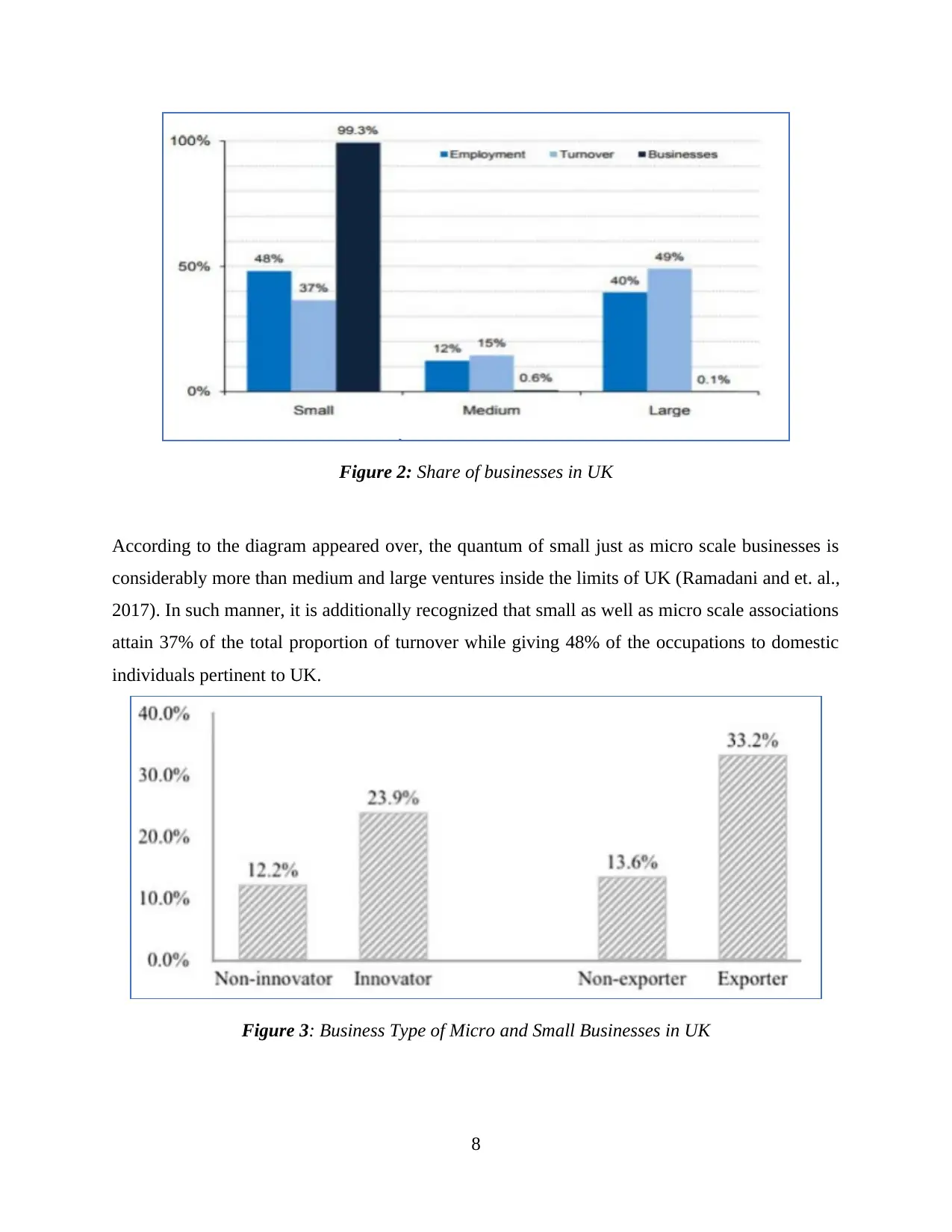
Figure 2: Share of businesses in UK
According to the diagram appeared over, the quantum of small just as micro scale businesses is
considerably more than medium and large ventures inside the limits of UK (Ramadani and et. al.,
2017). In such manner, it is additionally recognized that small as well as micro scale associations
attain 37% of the total proportion of turnover while giving 48% of the occupations to domestic
individuals pertinent to UK.
Figure 3: Business Type of Micro and Small Businesses in UK
8
According to the diagram appeared over, the quantum of small just as micro scale businesses is
considerably more than medium and large ventures inside the limits of UK (Ramadani and et. al.,
2017). In such manner, it is additionally recognized that small as well as micro scale associations
attain 37% of the total proportion of turnover while giving 48% of the occupations to domestic
individuals pertinent to UK.
Figure 3: Business Type of Micro and Small Businesses in UK
8
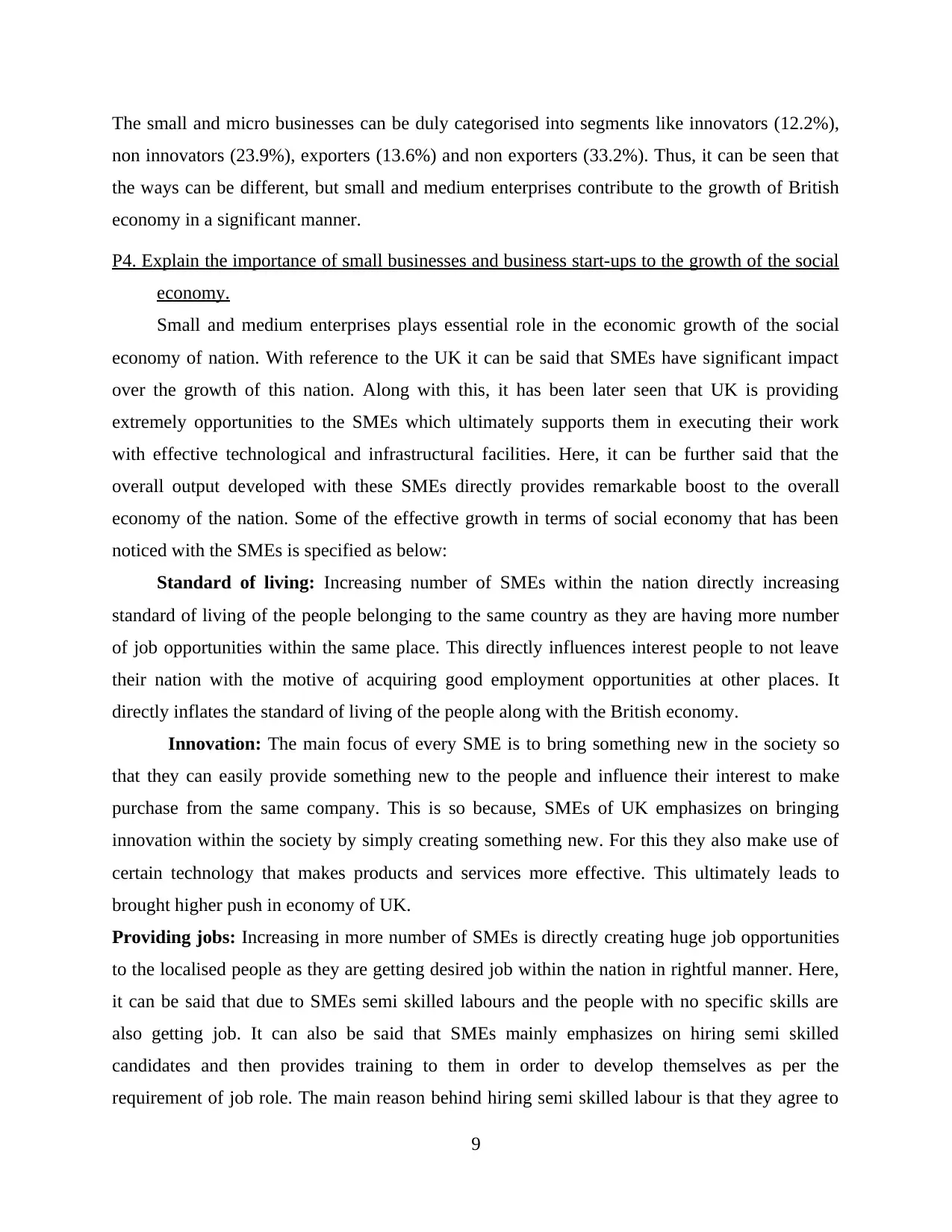
The small and micro businesses can be duly categorised into segments like innovators (12.2%),
non innovators (23.9%), exporters (13.6%) and non exporters (33.2%). Thus, it can be seen that
the ways can be different, but small and medium enterprises contribute to the growth of British
economy in a significant manner.
P4. Explain the importance of small businesses and business start-ups to the growth of the social
economy.
Small and medium enterprises plays essential role in the economic growth of the social
economy of nation. With reference to the UK it can be said that SMEs have significant impact
over the growth of this nation. Along with this, it has been later seen that UK is providing
extremely opportunities to the SMEs which ultimately supports them in executing their work
with effective technological and infrastructural facilities. Here, it can be further said that the
overall output developed with these SMEs directly provides remarkable boost to the overall
economy of the nation. Some of the effective growth in terms of social economy that has been
noticed with the SMEs is specified as below:
Standard of living: Increasing number of SMEs within the nation directly increasing
standard of living of the people belonging to the same country as they are having more number
of job opportunities within the same place. This directly influences interest people to not leave
their nation with the motive of acquiring good employment opportunities at other places. It
directly inflates the standard of living of the people along with the British economy.
Innovation: The main focus of every SME is to bring something new in the society so
that they can easily provide something new to the people and influence their interest to make
purchase from the same company. This is so because, SMEs of UK emphasizes on bringing
innovation within the society by simply creating something new. For this they also make use of
certain technology that makes products and services more effective. This ultimately leads to
brought higher push in economy of UK.
Providing jobs: Increasing in more number of SMEs is directly creating huge job opportunities
to the localised people as they are getting desired job within the nation in rightful manner. Here,
it can be said that due to SMEs semi skilled labours and the people with no specific skills are
also getting job. It can also be said that SMEs mainly emphasizes on hiring semi skilled
candidates and then provides training to them in order to develop themselves as per the
requirement of job role. The main reason behind hiring semi skilled labour is that they agree to
9
non innovators (23.9%), exporters (13.6%) and non exporters (33.2%). Thus, it can be seen that
the ways can be different, but small and medium enterprises contribute to the growth of British
economy in a significant manner.
P4. Explain the importance of small businesses and business start-ups to the growth of the social
economy.
Small and medium enterprises plays essential role in the economic growth of the social
economy of nation. With reference to the UK it can be said that SMEs have significant impact
over the growth of this nation. Along with this, it has been later seen that UK is providing
extremely opportunities to the SMEs which ultimately supports them in executing their work
with effective technological and infrastructural facilities. Here, it can be further said that the
overall output developed with these SMEs directly provides remarkable boost to the overall
economy of the nation. Some of the effective growth in terms of social economy that has been
noticed with the SMEs is specified as below:
Standard of living: Increasing number of SMEs within the nation directly increasing
standard of living of the people belonging to the same country as they are having more number
of job opportunities within the same place. This directly influences interest people to not leave
their nation with the motive of acquiring good employment opportunities at other places. It
directly inflates the standard of living of the people along with the British economy.
Innovation: The main focus of every SME is to bring something new in the society so
that they can easily provide something new to the people and influence their interest to make
purchase from the same company. This is so because, SMEs of UK emphasizes on bringing
innovation within the society by simply creating something new. For this they also make use of
certain technology that makes products and services more effective. This ultimately leads to
brought higher push in economy of UK.
Providing jobs: Increasing in more number of SMEs is directly creating huge job opportunities
to the localised people as they are getting desired job within the nation in rightful manner. Here,
it can be said that due to SMEs semi skilled labours and the people with no specific skills are
also getting job. It can also be said that SMEs mainly emphasizes on hiring semi skilled
candidates and then provides training to them in order to develop themselves as per the
requirement of job role. The main reason behind hiring semi skilled labour is that they agree to
9
⊘ This is a preview!⊘
Do you want full access?
Subscribe today to unlock all pages.

Trusted by 1+ million students worldwide
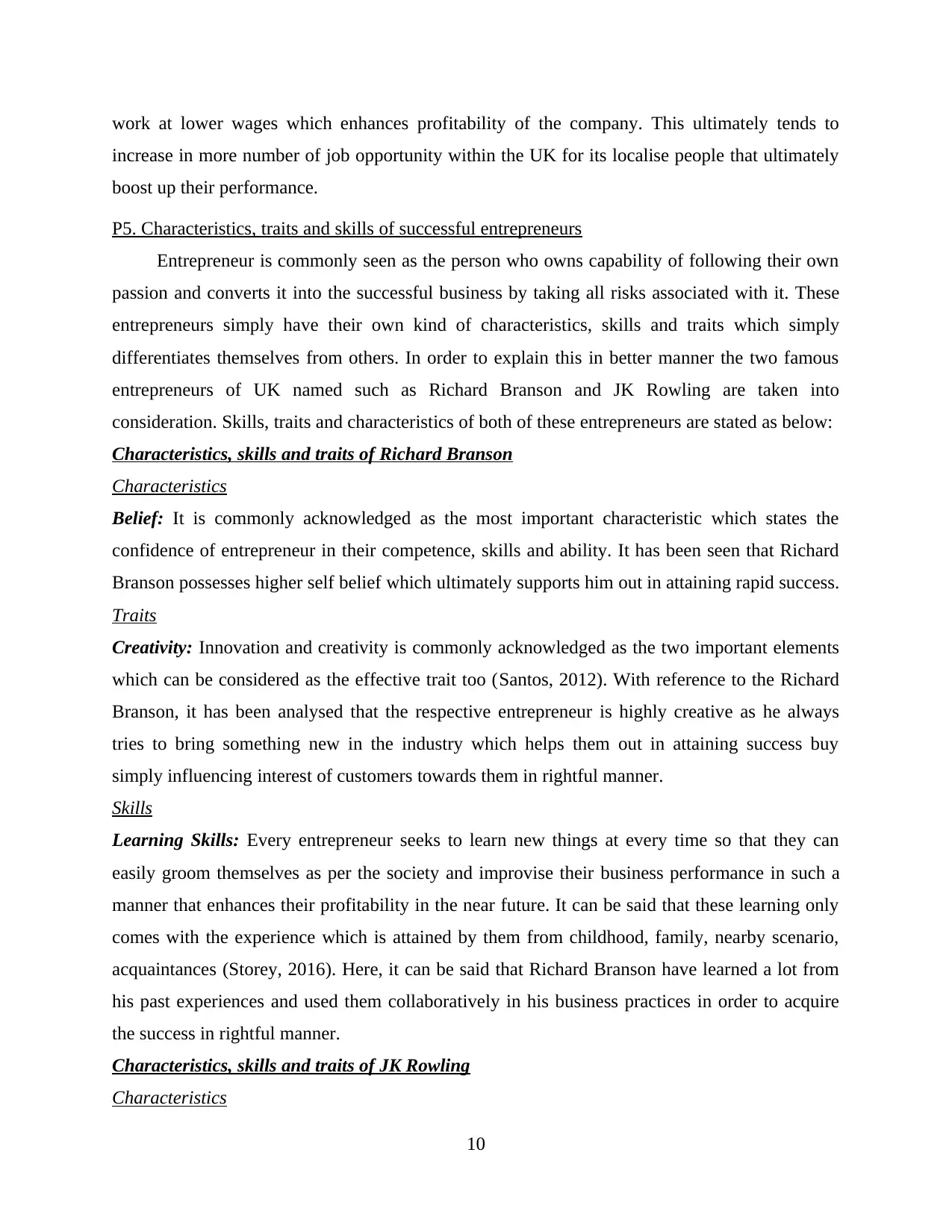
work at lower wages which enhances profitability of the company. This ultimately tends to
increase in more number of job opportunity within the UK for its localise people that ultimately
boost up their performance.
P5. Characteristics, traits and skills of successful entrepreneurs
Entrepreneur is commonly seen as the person who owns capability of following their own
passion and converts it into the successful business by taking all risks associated with it. These
entrepreneurs simply have their own kind of characteristics, skills and traits which simply
differentiates themselves from others. In order to explain this in better manner the two famous
entrepreneurs of UK named such as Richard Branson and JK Rowling are taken into
consideration. Skills, traits and characteristics of both of these entrepreneurs are stated as below:
Characteristics, skills and traits of Richard Branson
Characteristics
Belief: It is commonly acknowledged as the most important characteristic which states the
confidence of entrepreneur in their competence, skills and ability. It has been seen that Richard
Branson possesses higher self belief which ultimately supports him out in attaining rapid success.
Traits
Creativity: Innovation and creativity is commonly acknowledged as the two important elements
which can be considered as the effective trait too (Santos, 2012). With reference to the Richard
Branson, it has been analysed that the respective entrepreneur is highly creative as he always
tries to bring something new in the industry which helps them out in attaining success buy
simply influencing interest of customers towards them in rightful manner.
Skills
Learning Skills: Every entrepreneur seeks to learn new things at every time so that they can
easily groom themselves as per the society and improvise their business performance in such a
manner that enhances their profitability in the near future. It can be said that these learning only
comes with the experience which is attained by them from childhood, family, nearby scenario,
acquaintances (Storey, 2016). Here, it can be said that Richard Branson have learned a lot from
his past experiences and used them collaboratively in his business practices in order to acquire
the success in rightful manner.
Characteristics, skills and traits of JK Rowling
Characteristics
10
increase in more number of job opportunity within the UK for its localise people that ultimately
boost up their performance.
P5. Characteristics, traits and skills of successful entrepreneurs
Entrepreneur is commonly seen as the person who owns capability of following their own
passion and converts it into the successful business by taking all risks associated with it. These
entrepreneurs simply have their own kind of characteristics, skills and traits which simply
differentiates themselves from others. In order to explain this in better manner the two famous
entrepreneurs of UK named such as Richard Branson and JK Rowling are taken into
consideration. Skills, traits and characteristics of both of these entrepreneurs are stated as below:
Characteristics, skills and traits of Richard Branson
Characteristics
Belief: It is commonly acknowledged as the most important characteristic which states the
confidence of entrepreneur in their competence, skills and ability. It has been seen that Richard
Branson possesses higher self belief which ultimately supports him out in attaining rapid success.
Traits
Creativity: Innovation and creativity is commonly acknowledged as the two important elements
which can be considered as the effective trait too (Santos, 2012). With reference to the Richard
Branson, it has been analysed that the respective entrepreneur is highly creative as he always
tries to bring something new in the industry which helps them out in attaining success buy
simply influencing interest of customers towards them in rightful manner.
Skills
Learning Skills: Every entrepreneur seeks to learn new things at every time so that they can
easily groom themselves as per the society and improvise their business performance in such a
manner that enhances their profitability in the near future. It can be said that these learning only
comes with the experience which is attained by them from childhood, family, nearby scenario,
acquaintances (Storey, 2016). Here, it can be said that Richard Branson have learned a lot from
his past experiences and used them collaboratively in his business practices in order to acquire
the success in rightful manner.
Characteristics, skills and traits of JK Rowling
Characteristics
10
Paraphrase This Document
Need a fresh take? Get an instant paraphrase of this document with our AI Paraphraser
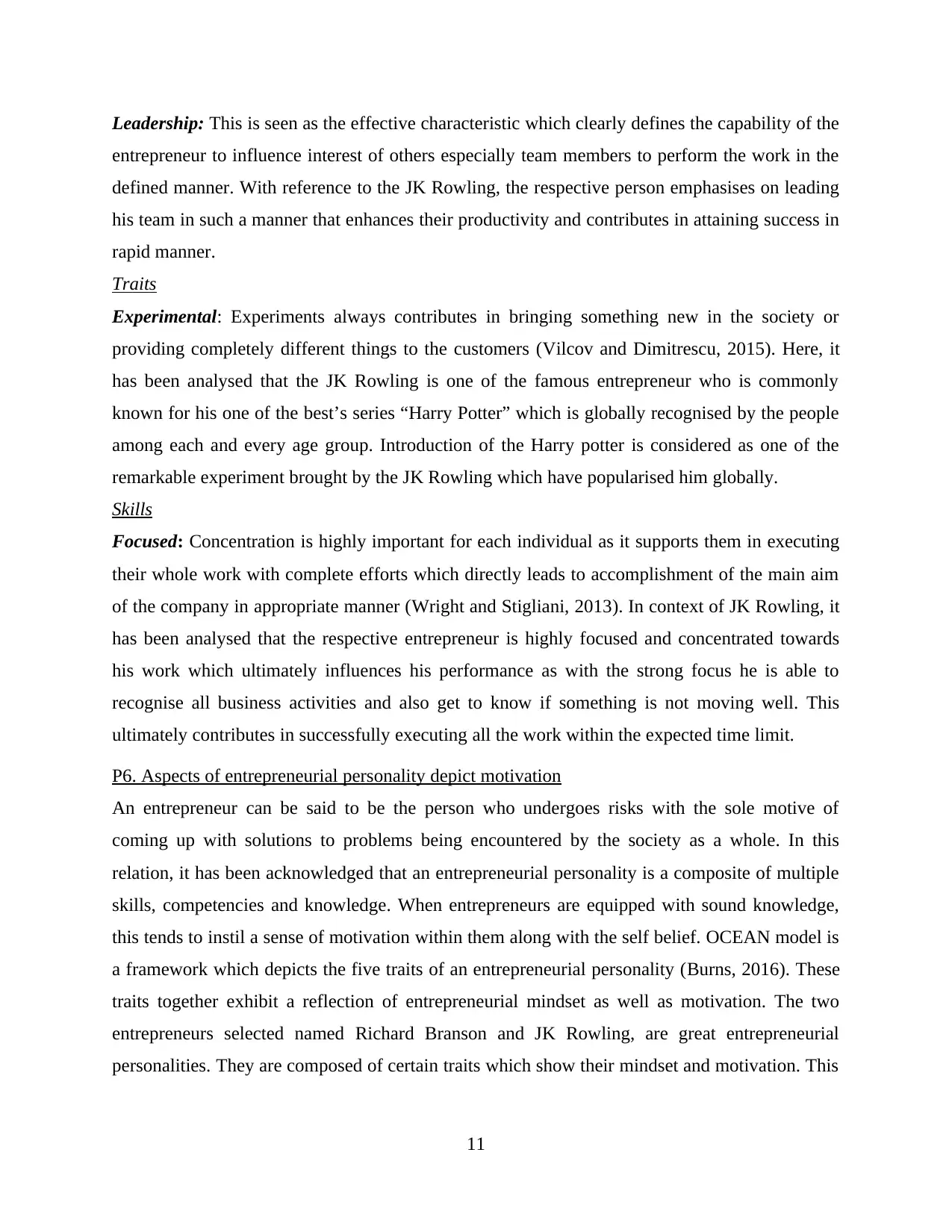
Leadership: This is seen as the effective characteristic which clearly defines the capability of the
entrepreneur to influence interest of others especially team members to perform the work in the
defined manner. With reference to the JK Rowling, the respective person emphasises on leading
his team in such a manner that enhances their productivity and contributes in attaining success in
rapid manner.
Traits
Experimental: Experiments always contributes in bringing something new in the society or
providing completely different things to the customers (Vilcov and Dimitrescu, 2015). Here, it
has been analysed that the JK Rowling is one of the famous entrepreneur who is commonly
known for his one of the best’s series “Harry Potter” which is globally recognised by the people
among each and every age group. Introduction of the Harry potter is considered as one of the
remarkable experiment brought by the JK Rowling which have popularised him globally.
Skills
Focused: Concentration is highly important for each individual as it supports them in executing
their whole work with complete efforts which directly leads to accomplishment of the main aim
of the company in appropriate manner (Wright and Stigliani, 2013). In context of JK Rowling, it
has been analysed that the respective entrepreneur is highly focused and concentrated towards
his work which ultimately influences his performance as with the strong focus he is able to
recognise all business activities and also get to know if something is not moving well. This
ultimately contributes in successfully executing all the work within the expected time limit.
P6. Aspects of entrepreneurial personality depict motivation
An entrepreneur can be said to be the person who undergoes risks with the sole motive of
coming up with solutions to problems being encountered by the society as a whole. In this
relation, it has been acknowledged that an entrepreneurial personality is a composite of multiple
skills, competencies and knowledge. When entrepreneurs are equipped with sound knowledge,
this tends to instil a sense of motivation within them along with the self belief. OCEAN model is
a framework which depicts the five traits of an entrepreneurial personality (Burns, 2016). These
traits together exhibit a reflection of entrepreneurial mindset as well as motivation. The two
entrepreneurs selected named Richard Branson and JK Rowling, are great entrepreneurial
personalities. They are composed of certain traits which show their mindset and motivation. This
11
entrepreneur to influence interest of others especially team members to perform the work in the
defined manner. With reference to the JK Rowling, the respective person emphasises on leading
his team in such a manner that enhances their productivity and contributes in attaining success in
rapid manner.
Traits
Experimental: Experiments always contributes in bringing something new in the society or
providing completely different things to the customers (Vilcov and Dimitrescu, 2015). Here, it
has been analysed that the JK Rowling is one of the famous entrepreneur who is commonly
known for his one of the best’s series “Harry Potter” which is globally recognised by the people
among each and every age group. Introduction of the Harry potter is considered as one of the
remarkable experiment brought by the JK Rowling which have popularised him globally.
Skills
Focused: Concentration is highly important for each individual as it supports them in executing
their whole work with complete efforts which directly leads to accomplishment of the main aim
of the company in appropriate manner (Wright and Stigliani, 2013). In context of JK Rowling, it
has been analysed that the respective entrepreneur is highly focused and concentrated towards
his work which ultimately influences his performance as with the strong focus he is able to
recognise all business activities and also get to know if something is not moving well. This
ultimately contributes in successfully executing all the work within the expected time limit.
P6. Aspects of entrepreneurial personality depict motivation
An entrepreneur can be said to be the person who undergoes risks with the sole motive of
coming up with solutions to problems being encountered by the society as a whole. In this
relation, it has been acknowledged that an entrepreneurial personality is a composite of multiple
skills, competencies and knowledge. When entrepreneurs are equipped with sound knowledge,
this tends to instil a sense of motivation within them along with the self belief. OCEAN model is
a framework which depicts the five traits of an entrepreneurial personality (Burns, 2016). These
traits together exhibit a reflection of entrepreneurial mindset as well as motivation. The two
entrepreneurs selected named Richard Branson and JK Rowling, are great entrepreneurial
personalities. They are composed of certain traits which show their mindset and motivation. This
11
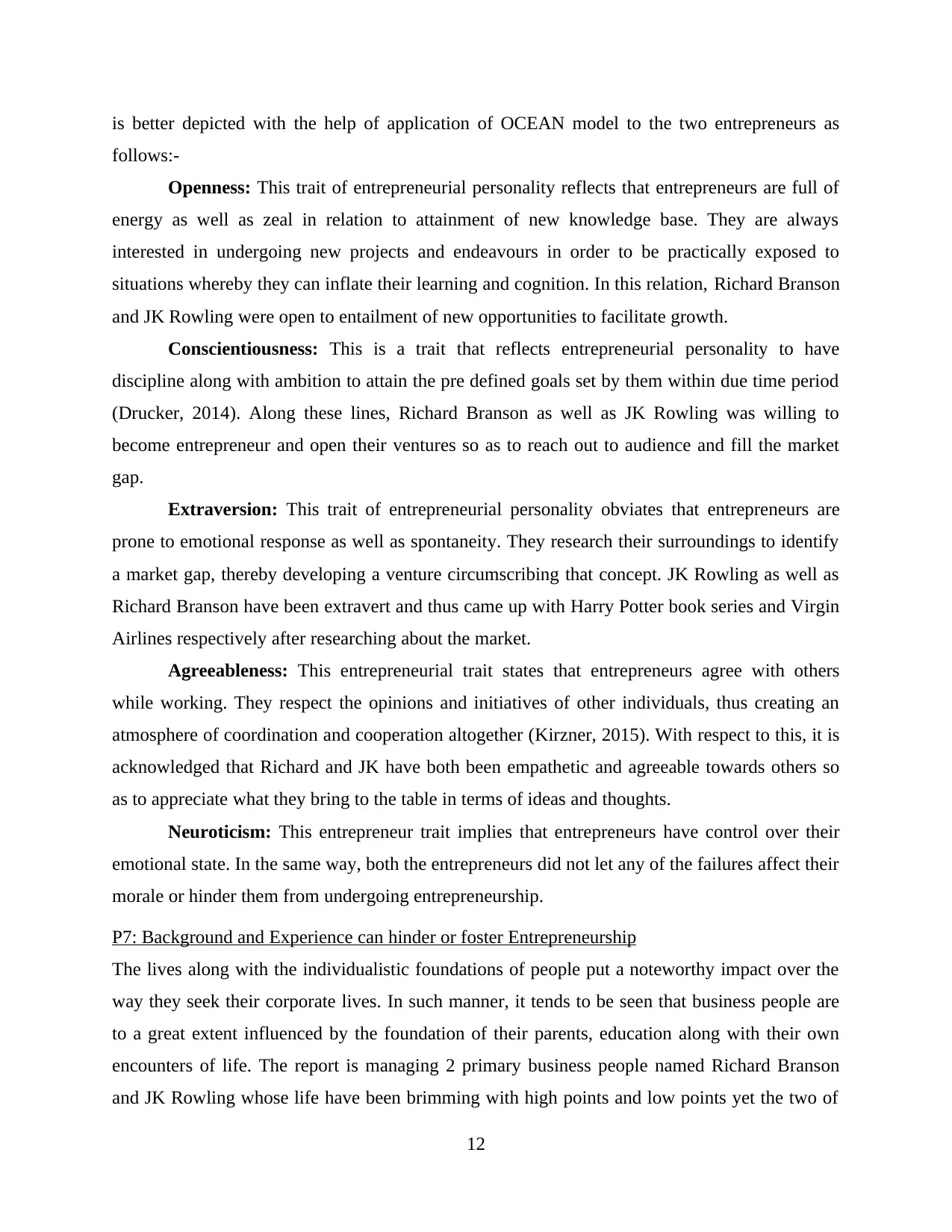
is better depicted with the help of application of OCEAN model to the two entrepreneurs as
follows:-
Openness: This trait of entrepreneurial personality reflects that entrepreneurs are full of
energy as well as zeal in relation to attainment of new knowledge base. They are always
interested in undergoing new projects and endeavours in order to be practically exposed to
situations whereby they can inflate their learning and cognition. In this relation, Richard Branson
and JK Rowling were open to entailment of new opportunities to facilitate growth.
Conscientiousness: This is a trait that reflects entrepreneurial personality to have
discipline along with ambition to attain the pre defined goals set by them within due time period
(Drucker, 2014). Along these lines, Richard Branson as well as JK Rowling was willing to
become entrepreneur and open their ventures so as to reach out to audience and fill the market
gap.
Extraversion: This trait of entrepreneurial personality obviates that entrepreneurs are
prone to emotional response as well as spontaneity. They research their surroundings to identify
a market gap, thereby developing a venture circumscribing that concept. JK Rowling as well as
Richard Branson have been extravert and thus came up with Harry Potter book series and Virgin
Airlines respectively after researching about the market.
Agreeableness: This entrepreneurial trait states that entrepreneurs agree with others
while working. They respect the opinions and initiatives of other individuals, thus creating an
atmosphere of coordination and cooperation altogether (Kirzner, 2015). With respect to this, it is
acknowledged that Richard and JK have both been empathetic and agreeable towards others so
as to appreciate what they bring to the table in terms of ideas and thoughts.
Neuroticism: This entrepreneur trait implies that entrepreneurs have control over their
emotional state. In the same way, both the entrepreneurs did not let any of the failures affect their
morale or hinder them from undergoing entrepreneurship.
P7: Background and Experience can hinder or foster Entrepreneurship
The lives along with the individualistic foundations of people put a noteworthy impact over the
way they seek their corporate lives. In such manner, it tends to be seen that business people are
to a great extent influenced by the foundation of their parents, education along with their own
encounters of life. The report is managing 2 primary business people named Richard Branson
and JK Rowling whose life have been brimming with high points and low points yet the two of
12
follows:-
Openness: This trait of entrepreneurial personality reflects that entrepreneurs are full of
energy as well as zeal in relation to attainment of new knowledge base. They are always
interested in undergoing new projects and endeavours in order to be practically exposed to
situations whereby they can inflate their learning and cognition. In this relation, Richard Branson
and JK Rowling were open to entailment of new opportunities to facilitate growth.
Conscientiousness: This is a trait that reflects entrepreneurial personality to have
discipline along with ambition to attain the pre defined goals set by them within due time period
(Drucker, 2014). Along these lines, Richard Branson as well as JK Rowling was willing to
become entrepreneur and open their ventures so as to reach out to audience and fill the market
gap.
Extraversion: This trait of entrepreneurial personality obviates that entrepreneurs are
prone to emotional response as well as spontaneity. They research their surroundings to identify
a market gap, thereby developing a venture circumscribing that concept. JK Rowling as well as
Richard Branson have been extravert and thus came up with Harry Potter book series and Virgin
Airlines respectively after researching about the market.
Agreeableness: This entrepreneurial trait states that entrepreneurs agree with others
while working. They respect the opinions and initiatives of other individuals, thus creating an
atmosphere of coordination and cooperation altogether (Kirzner, 2015). With respect to this, it is
acknowledged that Richard and JK have both been empathetic and agreeable towards others so
as to appreciate what they bring to the table in terms of ideas and thoughts.
Neuroticism: This entrepreneur trait implies that entrepreneurs have control over their
emotional state. In the same way, both the entrepreneurs did not let any of the failures affect their
morale or hinder them from undergoing entrepreneurship.
P7: Background and Experience can hinder or foster Entrepreneurship
The lives along with the individualistic foundations of people put a noteworthy impact over the
way they seek their corporate lives. In such manner, it tends to be seen that business people are
to a great extent influenced by the foundation of their parents, education along with their own
encounters of life. The report is managing 2 primary business people named Richard Branson
and JK Rowling whose life have been brimming with high points and low points yet the two of
12
⊘ This is a preview!⊘
Do you want full access?
Subscribe today to unlock all pages.

Trusted by 1+ million students worldwide
1 out of 15
Related Documents
Your All-in-One AI-Powered Toolkit for Academic Success.
+13062052269
info@desklib.com
Available 24*7 on WhatsApp / Email
![[object Object]](/_next/static/media/star-bottom.7253800d.svg)
Unlock your academic potential
Copyright © 2020–2026 A2Z Services. All Rights Reserved. Developed and managed by ZUCOL.





